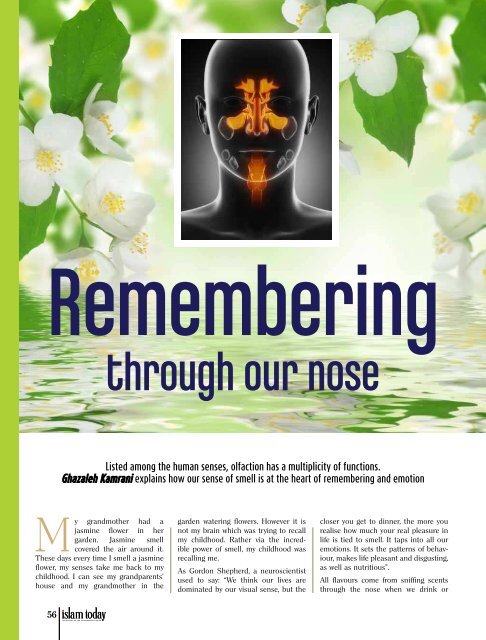Create successful ePaper yourself
Turn your PDF publications into a flip-book with our unique Google optimized e-Paper software.
Rememberingthrough our noseListed among the human senses, olfaction has a multiplicity of functions.Ghazaleh Kamrani explains how our sense of smell is at the heart of remembering and emotionMy grandmother had ajasmine flower in hergarden. Jasmine smellcovered the air around it.These days every time I smell a jasmineflower, my senses take me back to mychildhood. I can see my grandparents’house and my grandmother in thegarden watering flowers. However it isnot my brain which was trying to recallmy childhood. Rather via the incrediblepower of smell, my childhood wasrecalling me.As Gordon Shepherd, a neuroscientistused to say: “We think our lives aredominated by our visual sense, but thecloser you get to dinner, the more yourealise how much your real pleasure inlife is tied to smell. It taps into all ouremotions. It sets the patterns of behaviour,makes life pleasant and disgusting,as well as nutritious”.All flavours come from sniffing scentsthrough the nose when we drink orchew. The taste buds of our tongue andmouth actually detect only saltiness,sweetness, bitterness and sourness. Wewill have difficulty telling what we areeating.Women identify odours better than men,perhaps because they have paid moreattention to smells during cooking,or when using perfumes. Childrencan realise all the tastes while elderlypeople use more spices on their food asolfaction starts to assimilate.Trygg Engen, a noted psychologist ofsmell once said: “Odours stimulatehuman senses. Depending on whetherthe experience is pleasant or unpleasant,the odour will be remembered as goodor bad.”Although flowers like jasmine are seductiveand Hydrogen Sulphide is repellentto everyone, most of our reactions toodours are personal. For example, I lovethe smell of wet grass - it suffuses mewith memories of growing up. At thesame time, my cousin displays symptomsof sadness with this smell becauseit reminds him of the day he was playingfootball and he fell down and broke hisleg. The sense of smell is at the heart ofremembering and emotion.Places develop a “nest” odour. I canremember when I was a child; I wasuncomfortable entering the house ofone of my friends because of its unfamiliarodour. My friend’s brain usedto ignore this smell because it foundthe smell inconsequential - rather likesomeone with glasses who doesn’t feelthe slight pressure of the glasses on hisnose after a while.Odour molecules float in the air andwhen we sniff, these molecules go intoa hole near the brain by our nostrilsand become warm and humidify. Themolecules adhere to little mucus-bathedpatches of skin. Here, in a process that’sstill a mystery to science, the moleculesbind to receptors on tiny hair-like ciliaat both ends of the olfactory nerves, orneurons, which send messages to thebrain.When I smelled a jasmine flower, apleasurable signal travelled immediatelyinto the limbic region of my brain,evoking emotions and memories of mygrandmother. The signal passes by asingle nerve connection, which is calledthe synapse, at the olfactory bulbs(unlike the sensations of sight, sound,and touch that reach the limbic lobeacross more synapses). The bulbs areabove the nose, and are extensions ofthe brain that send the smell signal intothe limbic lobe.The part of the brain’s t<strong>issue</strong> which isrelated to smell works very well. Eventhough we may not be aware of smells,they have a very privileged access towhere our senses really live.The primitive animal’s brains weremostly limbic lobes. In humans thelimbic lobe is covered with neo-cortexand has a profound effect on our bodymetabolism. The hypothalamus - viathe pituitary gland - affects the limbicregion and it influences the entireendocrine hormones that regulate bodymetabolism, insulin, stress and muchmore.The ears’ neurons are separated fromoutside by tympanum, just like the eyesthat are separated by the cornea. Butolfactory receptors are in the environmentand directly reach the brain. Olfactoryneurons can replace themselvesunlike the body’s other nerve cells.As Dr. Pasquale Graziadei, a neurobiologistexplains: “If you damage a nervecell of your brain, you will never regainit. Lose the cells of your spinal cord,you have paralysis. Blow the neurons inyour retina or your ear, and you cannotrepair the damage. Since olfactorynerve cells can be replaced, the sense ofsmell has to be very important. Naturedoes not ever do anything for fun.” Healso believes that to some extent thebrain depends on the nose for its owndevelopment.In fact the olfactory system is veryplastic. Removal of a tadpole’s nosecauses that part of its brain to fail todevelop but removal of the olfactorybulb of a mouse leads new neurons totry to recreate the bulb in the brain.Remove 90% of the bulb, and the animalsmells very well but chop off only half ofthe human ear and we lose all the highsand lows of music. Nature protects whatis essential for survival. A blind rat stilllives very well, but without a sense ofsmell he cannot find food or mate.It is interesting to know that the olfactorysystem of a dog is more advancedthan that of humans. Dogs can smell afootprint and follow it and find objectsfrom long distances. The odours theysmell could be a mixture of pleasantand unpleasant odours.But indeed - thanks to our benevolentCreator - we can choose what we smell.We can enjoy odours that we choose tosmell because they are pleasurable andavoid those we do not find pleasant. Forexample when we pick up a flower andbring it near to our nose, it means thatwe want to smell its odour.If it was not due to our selective sense ofsmell, life as we know it would becomeincredibly difficult for us. •Ghazaleh Kamraniis a cellular andmolecular biologyundergraduatestudent.5657


